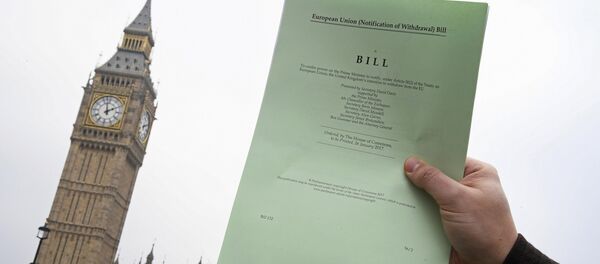Sputnik: We're getting closer and closer to 29 March. The prime minister is sure she can get a deal through Parliament. Why is she so confident despite the seeming deadlock?
Iain Begg: I think the reason why Theresa May is confident she can get the deal through Parliament is that she is hoping to peel off a sufficient number of Labour members of Parliament to back her deal to offset any of her own party that she loses. And we did see in the previous so-called "meaningful vote" a number of Labour MPs voting against the party line in a way that enabled her to have, I won't say a triumph, but at least a success narrowly winning the vote a couple of weeks ago.
READ MORE: If It's No Deal Brexit We're Going to Make Money — Businessman
Sputnik: Theresa May insisted that Brexit is going to happen on time. How probable is it at this point, when no breakthrough has been reached?
Iain Begg: I think she is going to struggle to maintain the 29 March date. Indeed, we recently decided to postpone an event predicated on that happening because we thought it would not. The reason for this is that there is a significant amount of UK parliamentary business that needs to be transacted to make the 29 March viable; there is also the need for ratification in the European Parliament.
Sputnik: Recently Jeremy Corbyn offered to help Theresa May if she consents to the certain terms, including joining the customs union. What are the odds that Mrs May will actually accept the Labour leader's assistance? Is that likely to happen, or is that just going to be out of the question?
Iain Begg: Jeremy Corbyn's idea is the indefinite article "a" as opposed to the definite article "the" customs union; and it's a rather vague position, because it implies that the Labour will give qualified support to Theresa May if she accepts the idea of remaining inside some form of customs union with the European Union.
Turkey has a formal customs union with the European Union, but it's not the customs union that all other member states are party to. It all sounds terribly pedantic; it does matter, because it means what Britain wants not to be party to is, for example, a customs union covering agriculture or fisheries; so it's all very obscure.
Several inside the Labour party are unhappy with Corbyn offering a deal to Theresa May, which has been described as giving the Tories a mandate to have a form of Tory Brexit which Labour Party members are opposed to. So it's all very much up in the air and we will be able to see machinations over the next week or so as they'll try to sort something out by the next so-called meaningful vote, which is on Valentine's Day, on the 14 of February.
READ MORE: Brexit Coordinator: May Vowed Irish Backstop Would Remain in Brexit Deal (VIDEO)
Sputnik: What is Mrs May's political future now? Obviously, she's been given an extended stay for at least a year after the vote of no confidence, where she was successful. Is she going to just stay for another year and then resign? What's your prediction for Mrs May?
Iain Begg: She said that she will leave office before the next general election. Probably when she said that, she had in mind that the next general election is scheduled based on the five-year Parliament for 2022. It's not inconceivable that the machinations in British politics will result in the general election taking place earlier. At that point, she is going to face difficult pressure.
Views and opinions, expressed in the article are those of Iain Begg and do not necessarily reflect those of Sputnik





